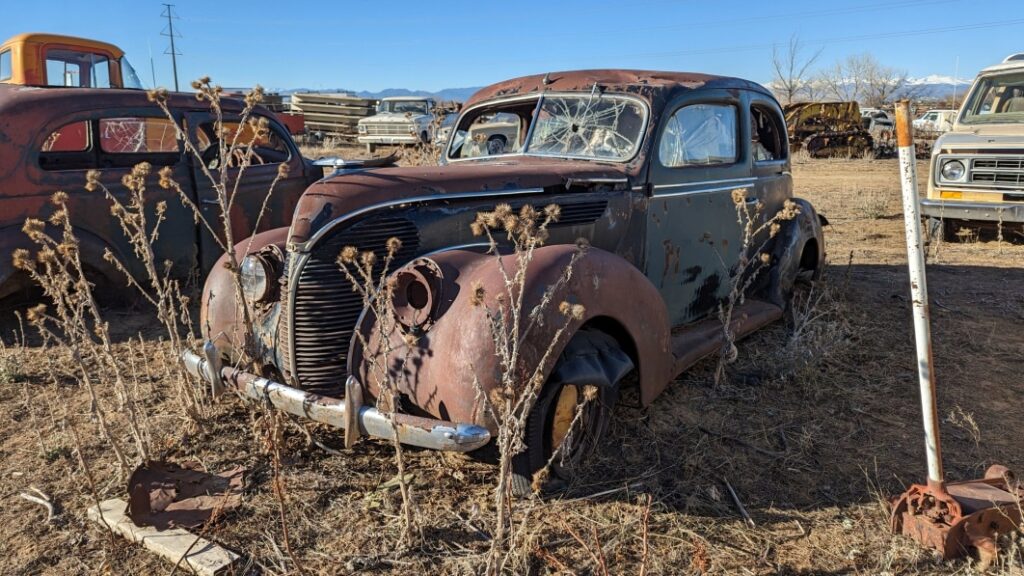Junkyard Gem: 1938 Ford De Luxe Tudor Sedan

Since most of the historical gems I document in the junkyard (that’s right, historical, so those of you who are fixing to blow a brain gasket because you don’t consider a certain Junkyard Gem to be as good as your beloved Chevelle SSs or Porsche 911s can calm down now) are found in the big self-service yards with high inventory turnover, I don’t write about many vehicles from the 1930s. Oh, sure, I do find such cars now and then — a 1937 Hudson and a 1938 Oldsmobile just this year, for example — but for prewar iron, it’s best to head for an old-time family-owned yard that’s been in the same spot forever.
Now that the former Martin Supply in Windsor, Colorado, has become a very professional but somewhat sterile seller of mostly late-model inventory, my go-to establishment when I want to give my old film cameras a workout is now Speedway Auto Wrecking, just off I-25 in Dacono. Speedway is only open on Saturday mornings now, but it’s worth scheduling your weekend around a visit. There are hundreds, maybe thousands of American cars and trucks from the 1930s through 1970s in this sprawling family-owned yard a half-hour north of Denver.

I found this Ford not too far from the section with all the Chevrolet Vegas and Chevettes (at least a couple of dozen of each) and an easy walk to the 30 or so Corvairs. I was there with my artist friend, Paul Heaston, who sketched a portrait of the Dodge truck you see in the background while I shot photos.

I brought a foursome of American film cameras from the 1910s-1950s period with me, but I haven’t developed the film yet. Check in at my photography page later to see the shots.

Judging by the apparent vintage and decayed condition of the tires plus the completely sun-nuked interior, I’m going to guess that this car last moved under its own power when Dwight D. Eisenhower was president.

Ford was notable during the 1930s for selling low-cost cars with eight-cylinder engines. Chevrolets and Plymouths had to get by with straight-sixes in 1938.

And Ford’s eight-bangers weren’t old-timey straight-eights. This is the 221-cubic-inch (3.6-liter) flathead V8, rated at an impressive 85 horsepower. Chevrolet’s six also made 85 horses that year, thanks to its modern overhead-valve design; the Plymouth flathead sixes made either 70 or 82 horsepower in 1938.

You could get the ’38 Ford with a smaller-displacement version of the flathead V8, known as the V8-60, but most American Ford buyers went for the 221.

Two trim levels were available for the 1938 Tudor two-door sedan: the upscale De Luxe and the penny-pinching Standard. This being the De Luxe, it has the snazzier grille.

The list price for this car was $665, or about $15,215 in 2022 dollars. That was quite a deal, and the De Luxe Tudor was the second-best-selling version of the 1938 Ford (the Standard Tudor was #1), with better than 100,000 sold.

Plymouth’s De Luxe two-door sedan cost $773 that year, or about $16,223 today. Chevrolet’s counterpart, the Master De Luxe Coach, listed at $730 ($15,320 now). Chevrolet won the sales battle that year, with close to a half-million cars out the door, but Ford was close behind.

The interior in this one is nonexistent, basically. Perhaps someone will rescue this car, either for a period restoration or a hot rod, but there’s no hurry — the elements have already done about all the damage they can do to this car by now.
A new kind of value in the low-priced field!




